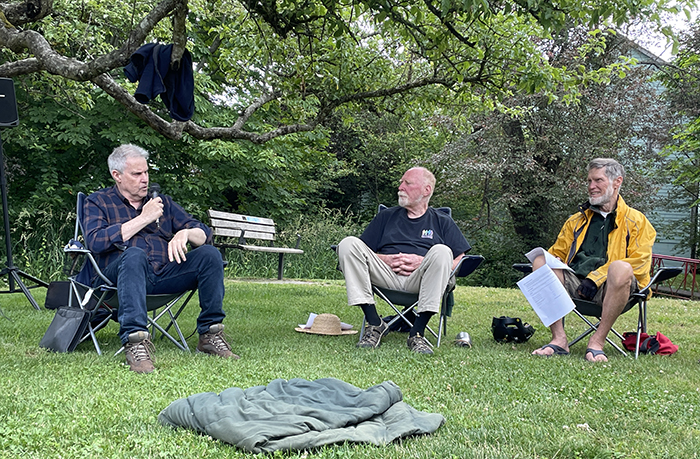What Salt Spring governance would look like with a local community commission (LCC) has become a bit more clear with release of two bylaws from the Capital Regional District (CRD).
Bylaws 4507 and 4508 — which would establish the LCC and delegate CRD powers to it — are expected to receive three readings at the CRD Board meeting today (July 13). Voter approval this fall will be needed to make the change.
An LCC format would see islanders vote for four LCC commissioners plus the CRD director. It would eliminate four current island-wide CRD commissions and then manage the services they are currently responsible for, along with other miscellaneous services. Bylaw 4507 lists 14 services from several different areas: parks and recreation, transportation and transit, liquid waste, economic sustainability, Fernwood dock, street lighting, grants-in-aid, livestock injury compensation, and the CRD financial contributions for ArtSpring, the library, and search and rescue group.
“All of those services will be delegated to the LCC,” explained CRD director Gary Holman, who supports the change, at a public ASK Salt Spring gathering in the United Church Meadow Friday. “The [Salt Spring electoral area] director will be part of the LCC and the LCC will have the same authority as the director now has regarding most services.”
The LCC will have a purely advisory role in some areas, said Holman, and cannot, by law, fetter the discretion of the director when it comes to voting at the CRD Board on certain issues. The same situation exists for municipal councils that have a representative on the CRD Board.
Bylaws 4507 and 4508 were created following release of a discussion paper on the topic authored by former Parks and Recreation Commission member Brian Webster, assisted by past Islands Trust CAO Linda Adams, and Richard Kerr, a previous alternate director to Holman. Input was also provided by an LCC advisory committee chaired by transportation commission chair and ASK Salt Spring organizer Gayle Baker.
“As a general statement, I would say not everything necessarily recommended in that [discussion] paper or recommended by the LCC Advisory Committee was taken up by CRD staff for various reasons,” said Holman. “But on the whole, this bylaw represents the fundamental approach recommended in that discussion paper and by the advisory committee.”
Other people at Friday’s meeting seemed pleased with the bylaw contents, and especially with the extent of the authority being delegated by the CRD.
Webster assessed the bylaws as not perfect, but said he believed “unreservedly” the LCC they enabled was “a step forward” for island governance.
“Personally, I’ve been pretty focused on the local community commission as a mechanism to make things work a bit better in our community. I’m convinced that it can, and having just looked at the [delegation] bylaw I’m convinced that this bylaw meets the test of doing that. Is it everything I want it to be? No. Would I add some additional services to the 14 services that are listed here? You bet I would. This is not perfection. But this is significantly closer to it than I thought CRD staff and Victoria could possibly come up with.”
Darryl Martin, who is president of the Salt Spring Chamber of Commerce and the LCC Advisory Committee vice chair, recited part of the “administrative authority” section of Bylaw 4508, noting it authorized an LCC to “enter into agreements respecting the undertaking, provision and operation of the district’s works and services,” and to identify and create “strategic plans and priorities, and service-specific operational policies.”
“To me, that’s significant authority,” said Martin.
For Holman, broadening of the decision-making process is one of the biggest benefits of an LCC.
“Many of the decisions now made by the director are going to be made in open public meetings and subject to a majority vote.”
As an example, Holman said, instead of a $5,000 grant-in-aid being given to a particular community group at the sole discretion of the director, “it’s going to have to be debated in a public meeting about whether that’s a good idea. And the same with all those other services that are designated.”
“The decision making will become a little more complicated, but so it should be. That’s what democracy is about.”
Maxine Leichter, who sits on the transportation commission and pays close attention to local government issues, expressed her positive opinion.
“My thought is that, yes, there are problems with the LCC, but there are problems with any kind of government. And so the real question should be, is this an improvement or not? And to me, it’s more democratic, so it’s an improvement.”
She said she has long been concerned about the CRD director having sole discretion over how a large amount of money is spent.
The bylaw states that the LCC must meet monthly, but Holman said that didn’t mean it couldn’t meet more often if needed.
The CRD estimates a change to an LCC system would add $168,610 to the annual budget, including 1.2 full-time-equivalent extra staff ($106,110 in the first year) and remuneration for commissioners at a suggested $10,000 level. Holman said he wasn’t convinced that an LCC would demand that much more staff time.
A referendum on whether or not to adopt the LCC governance format will be held in conjunction with local government elections on Oct. 15. If the referendum passes, elections for the four commission members will be subsequently held.
Bylaws and details are in the agenda package for the July 13 CRD Board meeting on crd.bc.ca.

